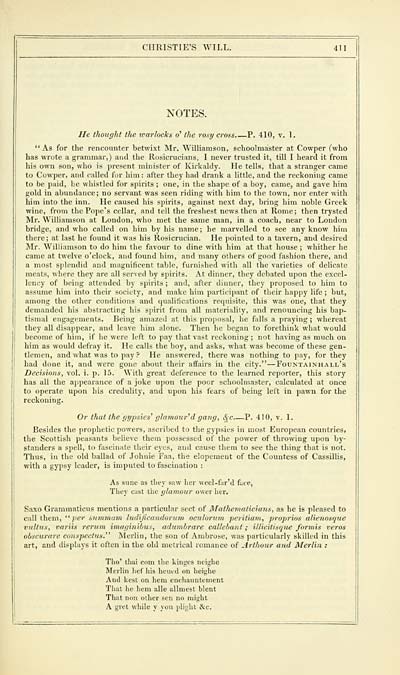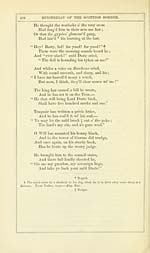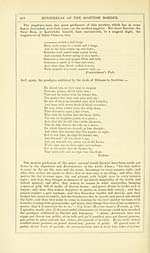Download files
Complete book:
Individual page:
Thumbnail gallery: Grid view | List view

CHRISTIE'S WILL.
NOTES.
He thought the warlocks o' the rosy cross P. 410, v. L
" As for the rencounter betwixt Mr. Williamson, schoolmaster at Cowper ("who
has wrote a grammar,) and the Rosicrucians, I never trusted it, till I heard it from
his own son, who is present minister of Kirkaldy. He tells, that a stranger came
to Cowper, and called for him : after they had drank a little, and the reckoning came
to be paid, he whistled for spirits ; one, in the shape of a boy, came, and gave him
gold in abundance; no servant was seen riding with him to the town, nor enter with
him into the inn. He caused his spirits, against next day, bring him noble Greek
wine, from the Pope's cellar, and tell the freshest news then at Rome; then trysted
Mr. Williamson at London, who met the same man, in a coach, near to London
bridge, and who called on him by his name; he marvelled to see any know him
there; at last he found it was his Rosicrucian. He pointed to a tavern, and desired
Mr. Williamson to do him the favour to dine with him at that house ; whither he
came at twelve o'clock, and found him, and many others of good fashion there, and
a most splendid and magnificent table, furnished with all the varieties of delicate
meats, where they are all served by spirits. At dinner, they debated upon the excel-
lency of being attended by spirits ; and, after dinner, they proposed to him to
assume him into their society, and make him participant of their happy life ; but,
among the other conditions and qualifications requisite, this was one, that they
demanded his abstracting his spirit from all materiaUty, and renouncing his bap-
tismal engagements. Being amazed at this proj)osal, he falls a praying ; whereat
they all disappear, and leave him alone. Then he began to forethink what would
become of him, if he were left to pay that vast reckoning ; not having as much on
him as would defray it. He calls the boy, and asks, what was become of these gen-
tlemen, and what was to pay.' He answered, there was nothing to pay, for they
had done it, and were gone about their affairs in the city." — Fountainhall's
Decisions, vol. i. p. 15. With great deference to the learned reporter, this story
has all the appearance of a joke upon the poor schoolmaster, calculated at once
to operate upon his credulity, and upon his fears of being left in pawn for the
reckoning.
Or that the gypsies' glamoured gang, S^c P. 410, v. 1.
Besides the prophetic powers, ascribed to the gypsies in most European countries,
the Scottish peasants beheve them possessed of the power of throwing upon by-
standers a spell, to fascinate their eyes, and cause them to see the thing that is not.
Thus, in the old ballad of Johnie Faa, the elopement of the Countess of Cassillis,
with a gypsy leader, is imputed to fascination :
As sune as they saw her wecl-far'd fuce,
They cast the glamour ower her.
Saxo Gramraaticus mentions a particular sect of Mathematicians, as he is pleased to
call them, " /je*" summam ludijicandorum oculoriim peritiam, proprios alienosque
vultus, variis rerum imaginibus, adumbrare callebant ; illicitisque formis veros
obscurare C07ispeclus." Merlin, the son of Ambrose, was particularly skilled in this
art, and displays it often in the old metrical romance of Arthour and Merlin :
Tho' thai com the kinges neighe
Merlin hef his heuid on heighc
And kest on hem cnchaunteuient
That he hem alia allmest blent
That Don other sen no might
A gret while y you plight &c.
NOTES.
He thought the warlocks o' the rosy cross P. 410, v. L
" As for the rencounter betwixt Mr. Williamson, schoolmaster at Cowper ("who
has wrote a grammar,) and the Rosicrucians, I never trusted it, till I heard it from
his own son, who is present minister of Kirkaldy. He tells, that a stranger came
to Cowper, and called for him : after they had drank a little, and the reckoning came
to be paid, he whistled for spirits ; one, in the shape of a boy, came, and gave him
gold in abundance; no servant was seen riding with him to the town, nor enter with
him into the inn. He caused his spirits, against next day, bring him noble Greek
wine, from the Pope's cellar, and tell the freshest news then at Rome; then trysted
Mr. Williamson at London, who met the same man, in a coach, near to London
bridge, and who called on him by his name; he marvelled to see any know him
there; at last he found it was his Rosicrucian. He pointed to a tavern, and desired
Mr. Williamson to do him the favour to dine with him at that house ; whither he
came at twelve o'clock, and found him, and many others of good fashion there, and
a most splendid and magnificent table, furnished with all the varieties of delicate
meats, where they are all served by spirits. At dinner, they debated upon the excel-
lency of being attended by spirits ; and, after dinner, they proposed to him to
assume him into their society, and make him participant of their happy life ; but,
among the other conditions and qualifications requisite, this was one, that they
demanded his abstracting his spirit from all materiaUty, and renouncing his bap-
tismal engagements. Being amazed at this proj)osal, he falls a praying ; whereat
they all disappear, and leave him alone. Then he began to forethink what would
become of him, if he were left to pay that vast reckoning ; not having as much on
him as would defray it. He calls the boy, and asks, what was become of these gen-
tlemen, and what was to pay.' He answered, there was nothing to pay, for they
had done it, and were gone about their affairs in the city." — Fountainhall's
Decisions, vol. i. p. 15. With great deference to the learned reporter, this story
has all the appearance of a joke upon the poor schoolmaster, calculated at once
to operate upon his credulity, and upon his fears of being left in pawn for the
reckoning.
Or that the gypsies' glamoured gang, S^c P. 410, v. 1.
Besides the prophetic powers, ascribed to the gypsies in most European countries,
the Scottish peasants beheve them possessed of the power of throwing upon by-
standers a spell, to fascinate their eyes, and cause them to see the thing that is not.
Thus, in the old ballad of Johnie Faa, the elopement of the Countess of Cassillis,
with a gypsy leader, is imputed to fascination :
As sune as they saw her wecl-far'd fuce,
They cast the glamour ower her.
Saxo Gramraaticus mentions a particular sect of Mathematicians, as he is pleased to
call them, " /je*" summam ludijicandorum oculoriim peritiam, proprios alienosque
vultus, variis rerum imaginibus, adumbrare callebant ; illicitisque formis veros
obscurare C07ispeclus." Merlin, the son of Ambrose, was particularly skilled in this
art, and displays it often in the old metrical romance of Arthour and Merlin :
Tho' thai com the kinges neighe
Merlin hef his heuid on heighc
And kest on hem cnchaunteuient
That he hem alia allmest blent
That Don other sen no might
A gret while y you plight &c.
Set display mode to: Large image | Transcription
Images and transcriptions on this page, including medium image downloads, may be used under the Creative Commons Attribution 4.0 International Licence unless otherwise stated. ![]()
| Early Gaelic Book Collections > J. F. Campbell Collection > Minstrelsy of the Scottish border > (505) |
|---|
| Permanent URL | https://digital.nls.uk/80606485 |
|---|
| Description | Volumes from a collection of 610 books rich in Highland folklore, Ossianic literature and other Celtic subjects. Many of the books annotated by John Francis Campbell of Islay, who assembled the collection. |
|---|
| Description | Selected items from five 'Special and Named Printed Collections'. Includes books in Gaelic and other Celtic languages, works about the Gaels, their languages, literature, culture and history. |
|---|

